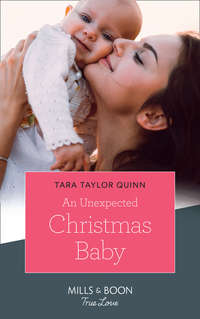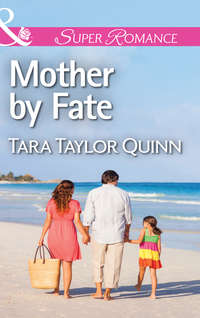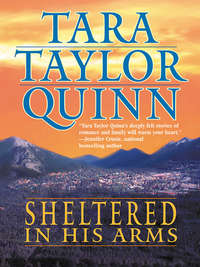
Полная версия
A Family For Christmas
People thought she lived alone. That, other than work, she spent her entire life alone. She knew some of her closest associates had concerns about her lack of outside life. She knew that, with loving hearts, they wondered about her. And every day, when she went out on the premises and offered smiles, when she brought calm to traumatic situations and gave peace to destroyed hearts, she also knew that she wasn’t alone. That she didn’t live alone. She and her baby girl, her precious daughter who’d only made it to the age of twelve, were in this together...
A knock sounded on her office door, and the pen she’d been holding over a form left a jagged mark on the signature line.
“Come in.” With her left hand still on the mouse, she quickly clicked out of the folder.
An impressive-looking suited man stepped halfway into her office. His short graying hair was impeccably in place, as was the silk tie inside his buttoned jacket. His features, while handsome, weren’t outwardly remarkable. Her stomach jolted anyway.
“Edward! I thought you’d gone. You have your dinner tonight...” Dr. Edward Mantle had been invited by a group of doctors he’d met at a recent hospital charity event to join them for their biweekly boys’ night out.
She’d thought he’d left without stopping in to say goodbye.
Not that he was required to do so. But he’d been in court that morning. She’d just kind of expected, since she’d been a rather major part of this journey with him and his family, that he’d fill her in.
She’d kind of expected him to let her know how lunch went with Joy, too. Instead of taking his new-to-him granddaughter overnight right away, they’d decided to try several more day outings first. Because he was from Florida, not familiar with Santa Raquel and staying in a hotel, Lila had been more involved with him than she might otherwise have been.
Most of her participation, however, had been exactly what she’d have done for any other child who’d just lost all of the family she’d ever known in a horrifically traumatic experience.
“I sent my regrets for this evening’s gathering,” Edward was saying. “You got a minute, or would you like me to catch up with you later?”
“Of course I have a minute.” Pushing aside the forms, Lila set down her pen and rose. “Have a seat.” She indicated the couch and took the armchair perpendicular to it. Her families always came first.
“I’ve just left Joy,” he said. Lila was not pleased by the rush of...lightness...at his remark. He’d come straight to her. As though they were somehow partners in the whole Mantle/Amos trauma.
In a sense they were, of course, partners. With boundaries. Professional boundaries.
Her only job was to facilitate as happy an outcome as she could. To be looking out for Joy’s well-being first and foremost.
She wasn’t faltering there. Joy came first. It was just...she cared, more than she felt comfortable with...about Joy’s grandfather’s feelings, too.
A widower whose only child was missing and presumed dead, the man was completely, utterly bereft.
Lila knew what that felt like. The loneliness. The burying of your own daughter. The loss of family. Of love.
And this wasn’t about her.
Edward wasn’t saying anything. He’d just left Joy. And was sitting in her office, on her couch, his elbows on his knees, rubbing his hands together.
The doctor who’d, overnight, left his practice in Florida to fly to California to find his daughter and take charge of his granddaughter, was clearly at a loss.
He’d come to her.
Her job was to comfort.
Leaning forward, Lila touched the top of his hand. Touching was not her job. She sat back but had his attention.
“Tell me about lunch with Joy.”
She needed to know what had happened in court that morning, too. Shawn Amos, Joy’s father and Cara’s husband, was supposed to have been indicted. And Chantel Fairbanks, a Santa Raquel detective and a member of the High Risk team that had been formed through The Lemonade Stand to help prevent domestic violence deaths, had put in a request for a meeting with the inmate before he was transported back to prison.
Chantel had wanted to speak with Shawn Amos, one on one, alone in a courthouse conference room, to see if she, a female alone, could get any more of a reaction out of him than any of the officers—both male and female—who’d questioned him repeatedly at the police station and in prison. But Joy came first. Edward had taken her to lunch.
“Not much to tell,” Edward said, looking at her, then back at his hands that were plastered together. “I took her to Uncle Bob’s.” A burger joint on the beach with an oversize sandbox. A favorite with most of the Santa Raquel kids Joy’s age. “When I asked her if she wanted to play in the sandbox, she shook her head...” His tired gaze settled on Lila and she couldn’t help but look for the light of quiet strength she’d come to associate with him. Finding it, she nodded at him to continue, clasping her own hands together to keep herself from reaching for him again.
“Did she hold your hand as you walked inside?” Lila asked. They’d been working on it all week. Edward holding out his hand to the little girl. Repeatedly. Hoping she’d take it.
He shook his head.
Joy went with Edward when she was told to do so. But she’d only ever spoken directly to him when she’d been defending Julie Fairbanks—a TLS volunteer whom Joy seemed to have adopted as a surrogate mother. She’d told him that he could not be her grandfather if he didn’t believe that Julie was the author of the children’s books Joy had clung to since arriving at the Stand.
Julie had penned—and drawn—the stories, but until Joy’s announcement, only the child and a few others had known that the twenty-nine-year-old philanthropist was also a successful author.
Until Julie worked with Joy, the little girl hadn’t spoken a word after she’d been brought to The Lemonade Stand. Julie, through Amy, the character in her books, had connected with the child enough for her to tell them that she’d witnessed her father beating her aunt and mother. That her mother had told her aunt to take Joy and run, and that the aunt had hidden with the child behind an old dog pen. From there, Joy had seen her father haul her mother away by her hair.
The aunt, Mary Amos, had then run with Joy to the neighbors for help, after which the woman had been rushed to the hospital where she’d later died.
Joy spoke to those caring for her at The Lemonade Stand now. She spoke to Julie and to Hunter, Edward’s nephew, fairly regularly, too. Spoke when spoken to. Or to make requests. But other than when she was at Edward’s and crying out for others, she never spoke to Edward.
“I ordered a burger and fries, and she ate every bite,” he said in the reserved way he had, taking his time.
Lila could see how strangers might see Edward as somewhat cold. And had no idea why she was so certain that a solid core of warmth ran deeply through him.
“That’s good, Edward.” Lila’s job was to help this family help the child, she reminded herself as she leaned forward, too, needing the widower to know he wasn’t alone. “If she wasn’t somewhat comfortable with you, she wouldn’t have a healthy appetite.”
“I took her to the toy store. I told her she could have anything she wanted.”
“Did she pick something?”
He shook his head again. “We walked every aisle.”
“That must have taken a long time.”
His grin made her heart leap. Because she needed so badly for this family to find healing. “Two hours,” he told her. “She touched a lot of things, studied some, but each time I asked her if she wanted it, she shook her head.”
“We don’t know what kind of conditioning she’s had,” Lila quickly pointed out, not wanting to let go of that smile. “Oftentimes, after an abuser has hurt his victim, he overcompensates by buying things.”
Edward nodded. “I know. I’ve read everything you’ve given me since Cara first went missing weeks ago. I just... I’ve never so much as frowned at Joy, so I didn’t think...surely children of abusers have others in their lives who buy them things just because they care about them.”
“Most do, of course. But until you win Joy’s trust, you aren’t, in her mind, in the category of those who care about her.”
He knew what they were dealing with. He, like everyone else caring for Joy, was in counseling with Sara Edwin, one of the Stand’s full-time counselors.
“When we got back here, I read to her. She sat next to me and watched as I turned the pages.”
“Amy books?”
“Of course.”
“Good.” Lila nodded.
“I couldn’t bring myself to leave her.”
“Did she seem distressed, having you there?”
“No.”
“Then this is progress.”
His gaze was direct this time. “I know. But I fear that I’m being selfish, as well. If I’m staying because I can’t bear leaving, is it her I’m putting first, or myself?”
“The fact that you’re asking the question is your answer. You can’t help loving her, needing to be with her. If you didn’t, you wouldn’t be good for her. Joy needs to know that there is someone who adores her, who will be there for her, no matter what. Someone who belongs to her. If you were forcing your presence on her when she showed signs of distress, that might be different.”
His smile was larger this time. Filled with the warmth that he didn’t often show—at least, not in the time she’d known him. She smiled back. It just came naturally.
And was something she did with others, too. So why did her heart suddenly feel such an acute stab of guilt? She was crossing a line that could not be crossed. Ever. With anyone. Anywhere.
“Have dinner with me.” His question intensified her guilt.
“I can’t.” She blurted the words. Completely unlike herself. Stared at him, afraid of what he might see within her.
“But I’ve got some wine and cheese in my suite here,” she said, effecting as much of her usual calm as she could muster. “I’m...staying here tonight...” she said—the truth, but she wasn’t staying because she had to. Only because she’d been planning to use the evening to catch up on the paperwork she’d just shoved aside on her desk.
“The wine—it can be tea, if you’d prefer—and I’ve got what’s left of a platter of meats and cheeses from a function earlier today. I’d been planning to indulge myself with it in lieu of dinner.”
She’d just invited a man to visit with her in her suite. What in the hell was happening to her?
Her suite at the Stand. Where she was always on call when she was in residence. And was often called. As opposed to alone with him, like a date, out...in the world. Where it was possible they could end up either at his hotel or her condo. Wasn’t going to happen, but the possibility made her more uncomfortable than wine and cheese at the Stand.
Okay...she had things more under control than she’d first thought.
“I’d like that very much.” Edward’s warm glance—not quite a smile, but bordering on personal—sent her into a tizzy all over again. As much as Lila ever got in a tizzy.
“Please, don’t misunderstand. I am not issuing an invi...”
His hand on hers cut her off. “I understand, Lila.” He looked her directly in the eye as he said the words. “I’d like to tell you about court this morning, if I may, and we both need sustenance. I would greatly enjoy a glass of wine to take the edge off a dreadful day, and will in no way compromise the friendship you’ve shown me by making more of it than it is.”
Her heart dropped. Jumped up and...just that, up and down, over and over, pounding in her chest. His words took her air, and brought it back in a whoosh. Ridiculous.
Unprovoked.
He considered her a friend.
And she wasn’t in danger of breaking her promise to herself.
The promise to never, ever, let anyone get close enough that he or she could be hurt.
Lila would rather be dead than be a danger to another living soul again.
CHAPTER SIX
Prospector, Nevada
HIS PATIENT ASKED if he minded if she went to bed to read as soon as the dinner dishes were done on Friday. Boxed macaroni and cheese with hotdogs and peas were his offering that night. He’d prepared it all. She’d eaten everything on her plate. And cleared and wiped the table while he’d washed up.
If he were planning to keep the cabin—to ever visit it again once his eye was better—he’d put in a dishwasher. Telling her he thought it was a good idea that she lie down, though it was still early in the evening, he watched her walk away. The woman bothered him.
He knew she was hurting. The way she held her book...turned pages...when she’d wiped off the table...her left wrist was bothering her. And her neck or shoulder was, too.
She was tired, but had been sleeping well, so he let it go for the night. He’d have a look at her in the morning. And in the meantime, he was past due for his drops. Six and six, every day, a.m. and p.m. Two drops each time.
In the bathroom, he tried not to notice the towel his patient had used that morning as he grabbed the drops from the zipped leather duffel under the sink that contained antibiotics, cold medicine, pain relievers and anything else he might need.
The drops were prescription. To relieve pressure on the eye. Pressure caused by swelling. Pressure that could prevent him from regaining his eyesight. Or could cause the process to happen more slowly.
Positioning himself in front of the mirror above the sink, he focused on his nose. Reached up over his head with his left hand, careful to keep his arm visible in the mirror to the only eye that could guide him and held open the lid of his right eye. The right hand had the easy part: lift until his hand was exactly half an inch from his nose and squeeze gently.
A drop fell to his cheek. Just under his eye.
Cursing his vision, he leaned his head back a second time, kept his nose in view in the mirror, measured the distance from the dropper and squeezed again. The drop hit his lower lid. He lifted his hand only slightly and tried one more time. He got the corner of his eye. He’d failed to measure from his nose that time.
If his damned nose wasn’t so big he could see the right eye from the corner of his left, could aim better. You’d think, after weeks of daily drops, he’d be a pro.
Especially for a surgeon with hands as steady as his were.
It was a mental block. He’d thought, when he’d first diagnosed the problem a while back, that the acknowledgment would take care of it. It hadn’t.
And so, after letting his arms rest for a moment, he once again got a fix on his nose in the mirror, raised his left arm over his head, slid his hand past his forehead to open his right lid and lifted the dropper to squeeze gently. Missed for a fourth time. His best was two attempts. His worst was nine. But he’d had a beer that night...
“What on earth are you doing?”
Two drops fell in quick succession, trailing down his right cheekbone. Arms coming down, Simon held the dropper and turned to face his patient. Still in her jeans and T-shirt, but minus the zipped sweater she’d had on all day, she was watching him.
He might have noticed her approach if he’d had peripheral vision in his right eye.
“Putting drops in my eye,” he said when he’d determined that doing so could be for something as simple as dry or itchy eyes.
“I’d have thought a surgeon would have a steadier hand.” She looked slightly down as she said the words. Such a funny combination of sassy and demure. Not that he was interested in her personality.
Or in anything other than her health. And then her departure.
“My hand’s plenty steady.” Childish of him to rise to her taunt, but her remark about not liking doctors was still ringing in his ears.
“Then you’re just a bad aim.”
“I blink.”
“No, you don’t.”
He didn’t think so. But he was damned well not going to tell her that he was temporarily blind in one eye. He’d come to the cabin to get away from the naysayers. Those who didn’t believe he’d ever see from that eye again. Those who thought that his recovery meant accepting the blindness and moving on. He didn’t want to hear another person tell him there were many things he could do besides be a surgeon. He couldn’t afford to listen. To let doubts creep in. He was going to see again. It was a matter of will, now.
So many times, the difference between a patient surviving or not depended not on medical skills or science, but on the patient’s will to live. Lucky for him that his patients were so young—they almost all had that will. In spades.
“You want help?”
As opposed to having her stand there watching him play his nightly game of drop ball?
“Yes.” He handed her the dropper. Told her he needed two drops, directly into the middle of the eye. Then bent down and leaned his head back so she could deliver them.
“Wow, you didn’t blink either time. How do you do that? I always blink when something’s coming at my eye.”
She was getting chattier. Good sign in terms of her recovery.
“Thank you,” he said, taking the dropper from her. She didn’t leave. And he realized that she’d been coming to use the restroom.
“If you’d like to leave your clothes outside your door when you go to bed, I’ll throw them in the wash again,” he told her. “Tomorrow we can see about getting you a T-shirt of mine to wear, too. Or a flannel. It’ll be long, but you can roll up the sleeves.”
“I’ll leave my clothes, thanks.”
He had a feeling that having him do her laundry wasn’t on the top of her list of desires, but what else could she do but sit around in the hospital gown he’d made for her or stand naked in the bathroom while the washer and dryer ran through their cycles?
Catching sight of the bruise closest to her mouth, he reached behind her neck and pulled her closer. Under the bright light of the bathroom he could get a better...
“Don’t.” She jerked away from him. And stood there, meeting his gaze and then looking away. “I’m s—”
“No,” Simon stepped back. “I am so sorry, Cara. My bedside manner is usually impeccable. I should have told you I’d like to have a closer look at your face...”
It was then that it dawned on him that she hadn’t just been reacting to his pulling her forward, but that she’d thought he had something else entirely on his mind.
As if he’d take advantage...
“Why do you need a closer look at my face?”
“That bruise to the side of your mouth...its color is a little suspicious...” There’d been a slight cut there. If he hadn’t cleaned it out well enough, an infection could have developed.
She stepped closer to him, but didn’t look at herself in the mirror.
“Have at it, Doc,” she said, sounding completely not at ease. So much so that Simon felt sorry for her.
The woman had a lot of spunk for someone who’d been a regular punching bag for her lowlife husband.
He checked her bruise. Suspected that the swelling on the left side of her face indicated a minor zygoma—cheek—fracture but from all signs, including lack of displacement, nose bleeds or undue pain, he believed it was one that would heal itself.
As long as nothing happened to displace it.
He told her his findings.
Then left the bathroom to her.
But something had changed in those moments back there. Something that was going to have some impact. He’d realized something.
Something big. And problematic.
There was no way he was going to let her just walk away, to go back out into the world all alone, to go back to the life she’d led, and let that bastard hit her again.
Santa Raquel, California
EDWARD TOOK OFF his jacket, hung it over the back of a chair at Lila’s small dinette. She’d seen him in golf attire a couple of times, but she wasn’t used to seeing him in a dress shirt without his suitcoat on. Why he’d suddenly seem more vulnerable, she had no idea, and wasn’t sure enough of herself where he was concerned to risk delving any further.
In the fourteen years since her previous life had ended, Lila had never, ever, not once, been even remotely tempted to notice a man’s...attributes. Hadn’t been physically activated by the sight of man for much longer than that.
She’d shown him to the small table instead of to the sitting area that was where she’d occasionally invited other special guests over the years, because the table had felt more formal. Now she wasn’t so sure.
“I like your place,” he told her. Looking around, she had to wonder. A man with his financial success...a man in general...couldn’t possibly feel comfortable in her small, completely feminine apartment. The place really only consisted of one room divided into living room and kitchenette by the table at which they sat. There was a separate bedroom. And a bath. The entire place was decorated with lace and roses; prints of places she’d once dreamed of traveling to were framed on the walls. Her dishes were china. A gift from Brett Ackerman, founder of The Lemonade Stand.
Ashamed that it made her feel good to be able to impress him with her crystal wineglasses—wanting him to notice them—she opened the bottle and poured, carried both glasses to the table and then retrieved the deli tray out of the refrigerator. Pouring crackers into a lacy cloth-lined basket, she reached into a drawer for two rose-and-lace napkins—ones that matched the placemats on the table—and slid two dessert plates out of another cupboard.
All was done with silent, deliberate movements. Edward Mantle needed a friend. And Lila had to find her peace.
“Did you decorate this place yourself?” he asked as she sat down across from him, careful to keep enough of a distance that their knees didn’t touch.
She and Sara had shared a meal at the table a time or two. Mostly, she sat there alone.
“Yes.” She took a sip of wine before he could think about offering a toast. Afraid that he’d toast to their friendship and her heart would react again. Or that he wouldn’t. And her heart would react again.
“It reminds me of a cross between a tea room my mother used to go to when I was a kid and the Florida room my wife had at home.”
His wife. Cara’s mother. Lila didn’t know much about the other woman except that she’d passed away when Cara was in high school.
“Do you still live in the same house?”
“No.” He shook his head. “Cara was already exhibiting signs of extreme anger and rebellion by the time my wife passed and I felt that getting her out of that environment, reminders of the eighteen months she spent watching her mother slowly fade away, would be better for her. She loved the beach so much and our old home was a twenty-minute drive...”
“Your house on the beach... You bought it for her.” Edward had first mentioned the house in front of Joy, thinking he’d pique the little girl’s interest, but the gambit had failed miserably. Joy had withdrawn at the mere mention of the beach.
“Yes.”
“How long did the two of you live there before she moved to California with Shawn?” Ran off with him was more like it. Edward’s daughter had disappeared into the night without warning or word. As Lila understood it, the two of them had been barely speaking at that point—Cara blaming Edward for her every unhappiness, accusing him of hating Shawn.
“We lived there together for two years,” Edward said, no rancor in his tone. “Her room is still just as she left it.”
That news—evidence of Edward’s hidden emotional depths—didn’t surprise Lila.
Cara had met the guy who ran a surfing school shortly after her mother died—Edward had been certain the school was a front for drugs, but the more he questioned, the more Cara pulled away, saying that he didn’t want her to be happy.
Once they were out of the state, Shawn had contacted Edward and let him know where they were living, that they’d married on the way across the country and that Edward was not to contact his daughter.
Edward had insisted on speaking with Cara—which he had—and Cara had, not kindly, reiterated her new husband’s words. She’d been eighteen at the time. Shawn had been several years older. They’d opened a surfing school in California.









